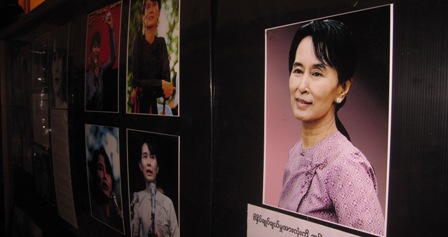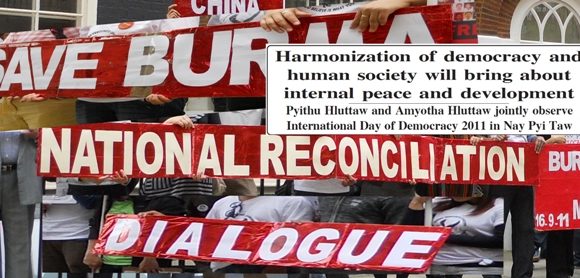Action Not Rhetoric A Chinland Guardian Commentary
The world is eagerly awaiting and left speculating on the what the United Nations envoy Ibrihim Gambari’s latest visit to Burma might bring to affect positive change in that country. Mr Gambari is now set to report to the Security Council on Friday on his meetings with Burma’s reclusive generals and
prodemocracy leader Aung San Suu Kyi. But few people now actually dare to hope that something substantive will come out of this latest visit to Burma, given that his previous attempts have met with little success in convincing the military junta to move toward a transition to democracy and national reconciliation. Worse still, skeptics fear, and perhaps rightly so, that the international community may once again fall for the junta’s empty promises and thus will ease pressures that have been mounting on the regime over the last few weeks. This is because false promises and bogus excuses will be precisely what it takes for the junta’s traditional powerful protectors such as China, Russia, and increasingly now India, to dismiss that Burma’s problems are only internal affairs and the country should be given a chance to solve its own problems. After all these are the same countries that have refused to agree to a binding and more forceful Security Council resolution on Burma in the first place – one that would have given Mr. Gambari the necessary implements that he needs to deliver effective and powerful message to the junta – that the would is loosing patience and that there is a consequence for habitual defiance of the international community.
The lack of punitive measures attached to a Security Council statement following the junta’s violent crackdown on peaceful protesters was enough indication for the generals of a lack of genuine international will to affect positive change in Burma. Mere rhetoric and condemnations without real actions are too corny at best, and the junta is counting on exactly that: Another empty rhetoric not backed by real action.
Meanwhile, the crackdown intensified in Rangoon and elsewhere against suspected participants of the recent protests. Sources inside the country reveal that as many as three hundred people may have been killed in the ensuing days since the protest began. Security forces and members of the junta’s own civilian proxy force known as the Union Solidarity and Development Association (USDA) have been conducting a reign of terror against civilians and monks suspected of having involved in the protest -away from the watchful eye of the international community and under the cover of darkness. Hundreds have been arrested, beaten and tortured. These were ongoing even as the UN envoy was still in the country trying to reason with the junta the wisdom of restraint from its violent and brutal ways.
Even before the protest began last month, Burma already has more than one thousand political prisoners cramped in the country’s jails notorious for inhumane conditions and being a place of torture. That number has now more than tripled with a very high likelihood that prisoners are being severely tortured. Rare images that have managed to find their way in the international media have shown uniformed soldiers savagely beating civilians as they were escorting them to prison trucks.
While there is still a lingering of hope and optimism that something positive might eventually come out of the whole situation, there is increasing concern that Burma’s situation will once again find its way in the very backseat of international attention. After all, for far too long the international community has almost completely forgotten the plight of the people of Burma, almost literally up until a month ago. The greatest concern now is that once the junta finally took back full control or has “restored normalcy,” crucial information and images from inside Burma that have sparked international outrage will soon begin to disappear and the people will once again be forced to suffer silently at the hands of the ruthless regime.
Dramatic events such as the latest protests tend to quickly grasp media attention and do regenerate international debate on Burma. But past experience tell us that such response are very short-lived, and only last for as long as the events themselves can last. Burma’s problems are not just about the hike in fuel price or the junta’s ruthless response to peaceful demonstrations on the streets of Rangoon. It is deep-seated and extends beyond protests in urban cities such as Rangoon and Mandalay. For decades, the country’s ethnic groups have been suffering unimaginable magnitude of horror and repressions in what many international human rights groups are calling genocide and crime against humanity – all with little awareness of the world community.
There now seems to be a consensus among the international community that Burma’s military junta must be held to account for their actions. Newly installed British Prime Minister Gordon Brown, for example, has suggested punishment for individual members of the regime, saying that the world will hold them to account for every action that they took in crushing prodemocracy movement. Many other world leaders have expressed the same sentiment.
The overwhelming world response to the latest events in Burma has come as tremendous encouragement to the Burmese opposition groups and their supporters around the world. Unfortunately, China and India, two of Burma’s neighboring countries with the most influence on the country’s generals have shied away from joining a growing chorus of international condemnation on Burma’s military regime.
Holding Burma’s generals to account for their crime against the citizens of Burma is long overdue. But the world will watch closely if governments that have pledged to bring about change to Burma would match their rhetoric with real action. After all rhetoric is just words and making empty promises is what the generals do best. At the end of the day, the international community will be judged by what it actually does than what it says.





